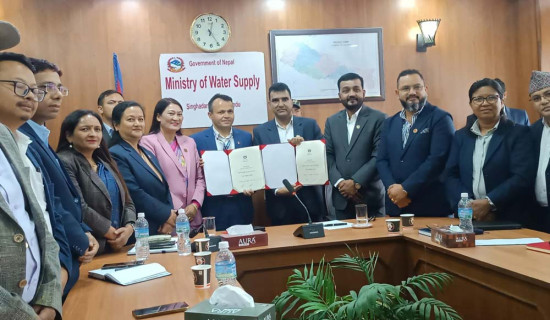- Friday, 9 May 2025
Fighting Modern Form Of Colonialism
Poverty and inequality are global problems, demanding global and national actions. They do not exist because of not having adequate resources and wealth but because of the lack of proper redistribution. While the governments and global developmental institutions have set goals to tackle poverty and inequality, the actual progress is slow, uneven and sometimes counterproductive.
According to a recent report by Oxfam International named Takers Not Makers: The unjust poverty and unearned wealth of colonial inheritance, inequality has increased globally as billionaire wealth has risen three times faster in 2024 than 2023. Over the past year, total billionaire wealth increased by $2 trillion and 204 new billionaires were created. In contrast, poverty reduction in the post-COVID period has been very slow and uneven. Further, the number of people living in poverty has not changed since 1990 because of crises of global economy, climate and conflict. While the popular reports show percentage change in poverty, the Oxfam report reports the number of poor people.
What is further interesting about the Oxfam report is the claim that most billionaire wealth is taken, not earned through hard work or entrepreneurship. It is found that 60 per cent of the wealth comes from either inheritance, cronyism and corruption or monopoly power. Indeed, existing inheritance laws provide little chance of wealth redistribution or making wealth through meritocracy, and thereby make the rich richer and poor poorer. As the 2030 deadline for the SDGs draws closer, the gap between the richest few and the rest has widened. The report claims that our deeply unequal world has a long history of colonial domination which has largely benefited the richest people. The report also maintains that the existing global order has the same corrupt nature as earlier colonial regimes.
Modern form of colonialism
There is evidence of the corrupt nature of modern form of colonialism. As stated in the report, the average Belgian has 180 times more voting power in the World Bank than the average Ethiopian. This power determines who benefits from the decisions of the global institutions such as the World Bank, IMF or the United Nations. When the decisions favour the North at the cost of the South, this results in the new form of colonialism and thereby domination. Such a situation can also be found at the national level where the purposefully-designed system enriches the wealthy at the expense of ordinary people. This supports the claim that foreign aid returns back to the donor countries with substantive gains.
In the absence of a just global order, both poverty and prosperity are inter-generationally transferable. Rich inherit wealth and poor inherit destitution. The report reveals that every global billionaire under the age of 30 inherited their wealth. In the meantime, many poor parents transfer their poverty to their children. This contradiction can be resolved if progressive tax policies are crafted and implemented. It has been argued that bridging the rich-poor gap is crucial for our economy, democracy, or for our collective future. Indeed, a poverty and inequality-stricken society is not our goal.
The report argues that beyond inheritance, monopoly power and crony connections to governments are crucial in perpetuating inequality. Such bad governance become a high toll for the poor people. It has been stated that monopolistic corporations control markets, dictate terms, and set prices with impunity, further enriching their billionaire owners. They wipe out small manufacturing units and business entities in the poor communities and countries. Technological monopoly forces such companies to the brink of closure. As argued by many critical political economy analysts, cronyism and corruption allow the super-rich to ensure government works for them, and not for ordinary people, states the report. The popularly known policy corruption both at the global and national levels is the outcome of such super-rich and top policy-makers nexus.
The report provides some pointers on how colonialism benefitted the super-rich of the Global North. Colonial powers looted the colonised world to that extent which became the foundation for global poverty and inequality. It has been stated that colonialism and slavery imposed severe exploitation, violence, racism, and domination on colonized people. Undermining human rights, the effects of the slave trade, which was crucial to the building of economies of European colonies, are still felt today. The new version of colonialism is manifested in the existing system that continues to extract wealth and power from ordinary workers in the Global South to rich people in the Global North.
Reparations
Exploitation of migrant workers by multinational companies is a case in point here. In contrast to the popular conviction, the report strikingly finds that $30 million dollars an hour is being paid by the Global South to the richest 1 percent in the richest countries. It provides some suggestions to overcome global poverty and inequality. First, countries must commit to aiming for the total income of the richest 10 per cent to be no more than the total income of the poorest 40 per cent through redistributive policies. Secondly, former colonial powers should offer reparations to the victims for their plundering.
Third, governments should work to end outdated and unjust global systems that create division and are no longer relevant to our current times. Finally, putting global tax measures in place to generate funds for poverty and inequality reduction through universal social protection schemes is equally crucial for a world that is equal and without poverty. Nepal should also apply these suggestions in its march towards a prosperous state.
(Dr. Bhusal is an expert on poverty and social protection.)
















